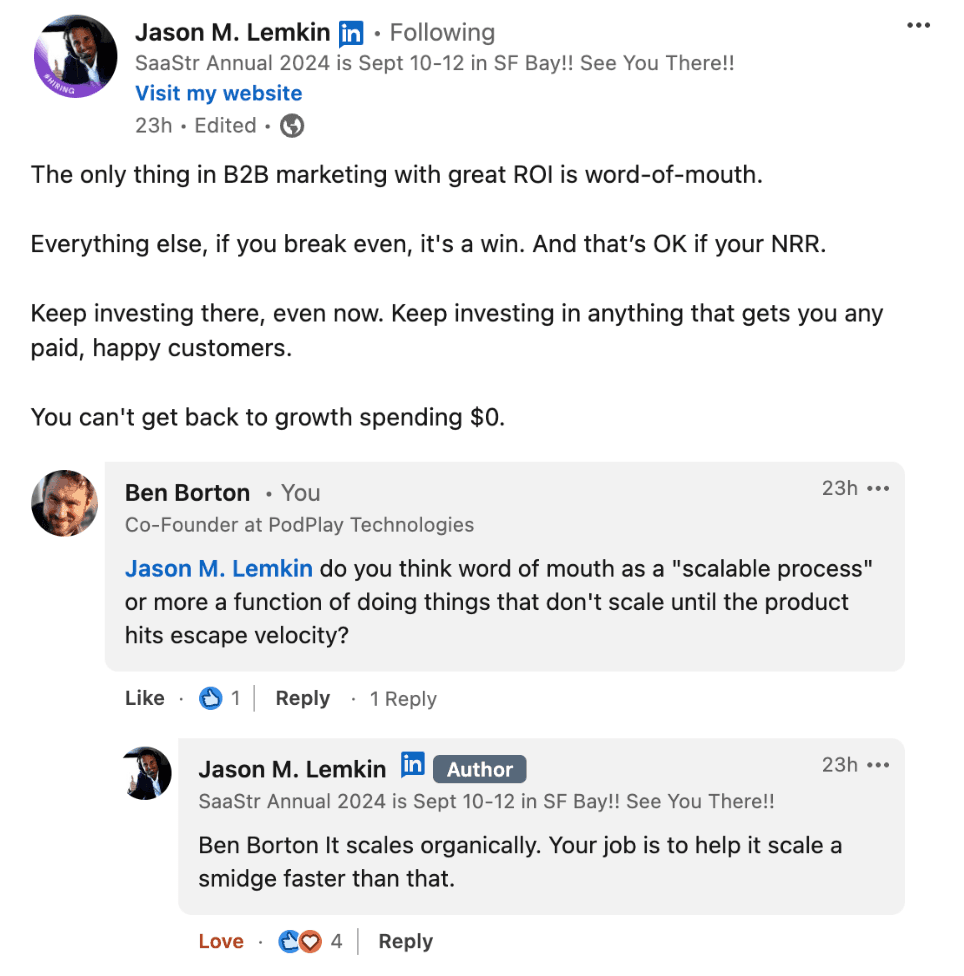Build Something You Are Proud Of
I had an interaction with Jason Lemkin this weekend that made me think about key drivers of word-of-mouth.
I agree with Jason that word-of-mouth is the ultimate cheat code for any software business. We should all do the little things - even those that don’t scale - to help word-of-mouth scale a smidge faster. But maybe there are also business principles/processes that can shift the odds of achieving explosive word-of-mouth in our favor.
The Propensity to Share
Humans want to share things they are proud of with others, including their loved ones. If the pride is genuine and based on a great mission, a great product, or better yet both, those you share with will tend to share with others. Like it or not, people tend to share things that make THEM look good. That characteristic - the propensity to share - is one of the pillars of strong word-of-mouth.
“Build something you are proud of” is a simple yet powerful principle of product design because it aligns product development with word-of-mouth. Do you genuinely want to share what you are building with everyone you meet? If so, you are probably pointed in the right direction, because that excitement tends to be infectious.
My sons (ages 12 and 9) went to camp at PodPlay client PingPod this summer. They helped me test out a new version of the PodPlay instant replay feature. They like to wear PingPod and PodPlay swag. My older son even requested shirts and sweatshirts to give to his friends!
Kids are notorious for thinking their parents are uncool. So if your kids are wearing company swag and providing feedback on new feature releases, you just might have a product with good word-of-mouth characteristics. As much as I would like to say my kids are getting behind PodPlay because I’m a great dad, this level of excitement was noticeably absent when I was running a SaaS business unit for a blockchain company.
PodPlay’s mission - to increase the quantum of fun being had in the world - is easy to understand. We pursue that mission by building digital tools to manage physical spaces that delight our client’s (sports clubs) end customers, including the world’s experts on fun: kids.
The Golden Rule of Product Design?
If word of mouth is the ultimate cheat code for a B2B SaaS business, then “build something you are proud of” may be the golden rule of product design. It provides clarity on questions that all SaaS development teams face and have the potential to blow up the product roadmap:
Should we roll out a quick hacky fix, or spend the extra resources to get to the elegant long term fix
Should we acquiesce to a client request for a feature that adds functionality at the expense of user experience?
Will this new feature delight a small subset of end customers or everyone?
Cultural values without execution are empty calories, so I would be remiss if I didn't credit our Head of Product, Doron Gura, who keeps PodPlay true to this philosophy day-to-day. Our whole team benefits from the wisdom Doron has built up working on familiar apps such as Nike+, MLB, Hulu, and Disney+.
Not only does “build something you are proud of” help product and engineering prioritize the roadmap, it also keeps the development team aligned with sales and marketing. I am the founder primarily in charge of sales and marketing for PodPlay, but giving demos of a product I’m proud of doesn’t feel like sales at all.
One of the first questions I ask on initial sales calls is: how did you find out about us? My favorite answer - and one I hear more and more as PodPlay gets wider adoption - is: “I used it at [insert PodPlay client name here] and I loved the experience.”
By adopting “build something you are proud of” as both a cultural value and design principle, I believe we have shifted the odds of word-of-mouth reaching escape velocity in our favor.
The PodPlay Advantage
PodPlay gives venue operators all the tools they need to digitally manage a physical space - integrating video replays, automated scoreboards, and autonomous functionality with a reservation engine, event management, coach connect, membership module, and payments.
Originally built to power PingPod, the network of futuristic autonomous ping pong clubs, PodPlay is now being used to manage venues across pickleball, padel, ping pong, golf simulators, racing simulators, soccer and pool, with more experience verticals to come in the future.
*Originally published by Ben Borton, Aug 12th, 2024. The article is on PodPlay's blog.

